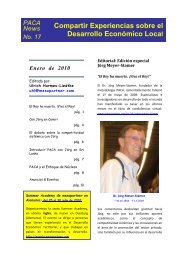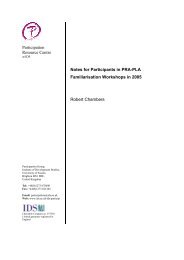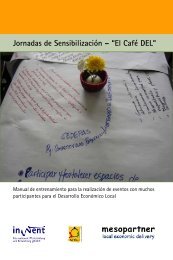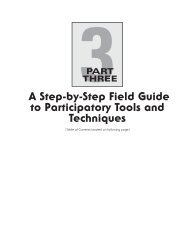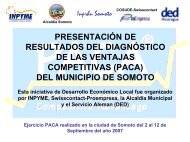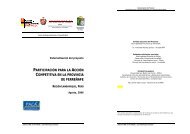McCormick+Schmitz Handbook for value chain research on - PACA
McCormick+Schmitz Handbook for value chain research on - PACA
McCormick+Schmitz Handbook for value chain research on - PACA
You also want an ePaper? Increase the reach of your titles
YUMPU automatically turns print PDFs into web optimized ePapers that Google loves.
Nevertheless, the sensitivity of homeworker <str<strong>on</strong>g>research</str<strong>on</strong>g> makes it especially important to be<br />
aware that, like many professi<strong>on</strong>als, <str<strong>on</strong>g>research</str<strong>on</strong>g>ers are bound by a code of ethics.<br />
13.4 Ethical questi<strong>on</strong>s in <str<strong>on</strong>g>research</str<strong>on</strong>g>ing home-based work<br />
The cardinal ethical precept in any type of <str<strong>on</strong>g>research</str<strong>on</strong>g> is “Do no harm.” Research should<br />
never cause injury - physical, psychological, ec<strong>on</strong>omic, or any other - to the people being<br />
studied. Two further principles flow from this. One is that participati<strong>on</strong> in a <str<strong>on</strong>g>research</str<strong>on</strong>g><br />
study should be voluntary and based <strong>on</strong> in<str<strong>on</strong>g>for</str<strong>on</strong>g>med c<strong>on</strong>sent. The other is that participants’<br />
privacy must be safeguarded. Simple and straight<str<strong>on</strong>g>for</str<strong>on</strong>g>ward as these seem, they can be<br />
difficult to put into practice. In this secti<strong>on</strong>, we discuss some of the ethical issues that can<br />
arise in carrying out <str<strong>on</strong>g>research</str<strong>on</strong>g> <strong>on</strong> home-based work.<br />
If you reread the account of the <str<strong>on</strong>g>research</str<strong>on</strong>g> visit to Maria’s home, you can see some of the<br />
ethical issues it raises (see Box 13.1). First, the <str<strong>on</strong>g>research</str<strong>on</strong>g>er arrived at Maria’s home with<br />
the intermediary. This could be c<strong>on</strong>fusing to Maria. In her culture, <strong>on</strong>e always welcomes a<br />
visitor warmly. To refuse to do so would be extremely rude. Yet in this situati<strong>on</strong>, to<br />
welcome the visitor is to allow herself to be observed as part of a <str<strong>on</strong>g>research</str<strong>on</strong>g> process. The<br />
<str<strong>on</strong>g>research</str<strong>on</strong>g>er in this case must take time to explain the nature of the <str<strong>on</strong>g>research</str<strong>on</strong>g> to Maria in<br />
clear and simple language and to find out whether she is willing to participate. This may<br />
be difficult because both Maria and the intermediary are accustomed to getting right down<br />
to the business of checking and counting finished garments. Ideally the process of<br />
explaining the <str<strong>on</strong>g>research</str<strong>on</strong>g> and obtaining c<strong>on</strong>sent should be completed be<str<strong>on</strong>g>for</str<strong>on</strong>g>e the visit, but<br />
that may not be feasible. Maria may not have a teleph<strong>on</strong>e, and she may not read well<br />
enough to understand a written explanati<strong>on</strong>. Nevertheless, it is up to the <str<strong>on</strong>g>research</str<strong>on</strong>g>er to<br />
develop procedures that ensure that Maria’s participati<strong>on</strong> in the study is voluntary.<br />
Researchers - or more often, their <str<strong>on</strong>g>research</str<strong>on</strong>g> assistants - are frequently tempted to<br />
‘encourage’ participati<strong>on</strong> in studies by using subtle <str<strong>on</strong>g>for</str<strong>on</strong>g>ms of coerci<strong>on</strong>. Sometimes it is a<br />
promise of some direct gain: ‘co-operative’ homeworkers will be given more business or<br />
higher rates. Sometimes it is a veiled threat of being dropped from the list <str<strong>on</strong>g>for</str<strong>on</strong>g> failing to<br />
participate. Not <strong>on</strong>ly are such tactics against the principle of free participati<strong>on</strong>, but they<br />
also frequently cause problems <str<strong>on</strong>g>for</str<strong>on</strong>g> <str<strong>on</strong>g>research</str<strong>on</strong>g>ers working in the same area at a later time.<br />
81




